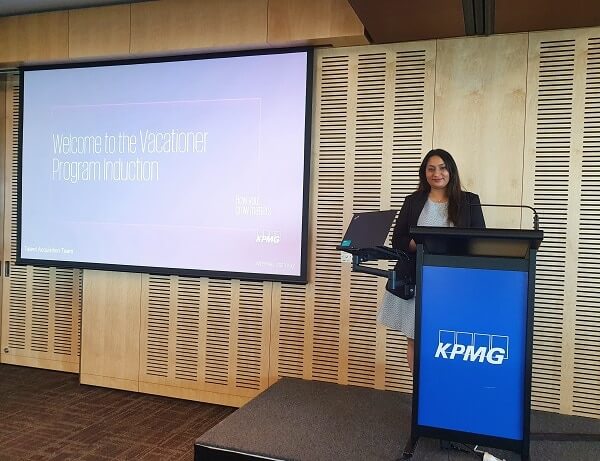In my career in Campus Recruitment for KPMG, I represent one of Australia’s largest professional services at universities, engaging with students, raising awareness of job opportunities at career fairs, and conducting university presentations.
In every facet of the job, I get to use skills that come naturally to me – public speaking, event management, and using my people skills to help others meet their career goals.
I love what I do and do what I love. But it wasn’t always like this.
Would you imagine that years ago, I was stuck behind a desk, reading old court cases for a degree I struggled in? Then pivoted to an accounting cadetship that I equally disliked?
Every step of the way, I’d listened to every other voice but my own. I was so scared of failure that I never stepped out of the box.
Now I spend my days making sure young graduates don’t make the same mistakes.
* * *
“What do you want to be when you grow up?”
We’ve all been asked this question. At a young age we are often pressured to start thinking about what our future is going to look like. Unfortunately, for many that thought is limited to the profession they are going to choose and the type of life that is going to enable them to have.
We forget to ask ourselves the more important questions such as “Does this future look sustainable?” or “Will it make me happy?”
In high school, I was not particularly inclined towards one profession or another, but what I knew for sure was that I needed to make the most of the opportunity my migrant parents had worked so hard to provide me.
READ ALSO: #MyWork: Group Fitness Instructor

I believed I would bring prestige to my family if I was to become a doctor, engineer, accountant, or lawyer.
Deciding on which one of these professions I would be best suited for, was difficult. I believed that my good grades in business studies and mathematics were a sign of proficiency, so I should lean towards a career in accounting or financial advisory.
I ended up selecting a Bachelor of Commerce.
However, a single degree appeared to be very basic. I believed this would not be comparable to studying medicine or engineering, so I decided to double up my degree and enrol in a Bachelor of Law as well.
On reflection, my decision making was poor. I did not consider my own strengths and passions, but rather focused on working towards a profession that would be ‘respected’ by my community.
At uni, I began to notice that I was not performing to my ability, and my grades reflected this. I was not enjoying Law: researching and reading were fundamental in getting good grades, and I did not enjoy either endeavour. This led to my marks dropping, and I could not figure out why, given I was putting in the same effort as always. A confidence-drop followed, and a toll on my mental health.
As an easy fix, I started to focus on Accounting and Commerce rather than Law.
Amidst all of this, I managed to secure a cadetship in a mid-tier accounting firm. I spent two years working there, and in this time, I realised that I could not see myself working in the profession long term. I was shattered.
I had spent years pursuing two degrees that I did not like, accumulated a large HECS debt, and was still lost when it came to my career.
Working and pursuing studies in fields I was not passionate about showed up on my transcript and in my work ethic. It took me longer to finish my degree, it led to me being unable to convert my cadetship into a graduate role. I felt like a failure and a disappointment.
But when you hit rock bottom, the only way to go is up.
And so I got right down to the basics, and analysed my own strengths and passions.
READ ALSO: Repeated mistakes: Why they don’t mean you are dumb!

I had always enjoyed public speaking.
I had proven skills in event management.
My people skills were considerable.
I decided on developing a career where I would utilise these inherent talents.
Through some trial and error, and the support of my family and boyfriend (now husband), I have built up my current career in Campus Recruitment.
There’s a spring in my step as I get to work every morning.
READ ALSO: Why university for school leavers should be free in 2022

Today, my own career trajectory is constantly in my mind as I go about my daily job.
As the next generation come through university, it is important for them to understand that passions, interests, and priorities will change as they grow older.
It is just as important for the older generation to understand that large organisations are placing less emphasis on degrees, and that students should no longer be participating blindly in a rat race.
My personal goal whilst on Campus is to engage with students and help them understand and unravel their own strengths. To help students realise their passions, I make sure to start conversations by asking them the inevitable and (in my case, dreaded) question:
“What do you want to be when you grow up, and why?”





